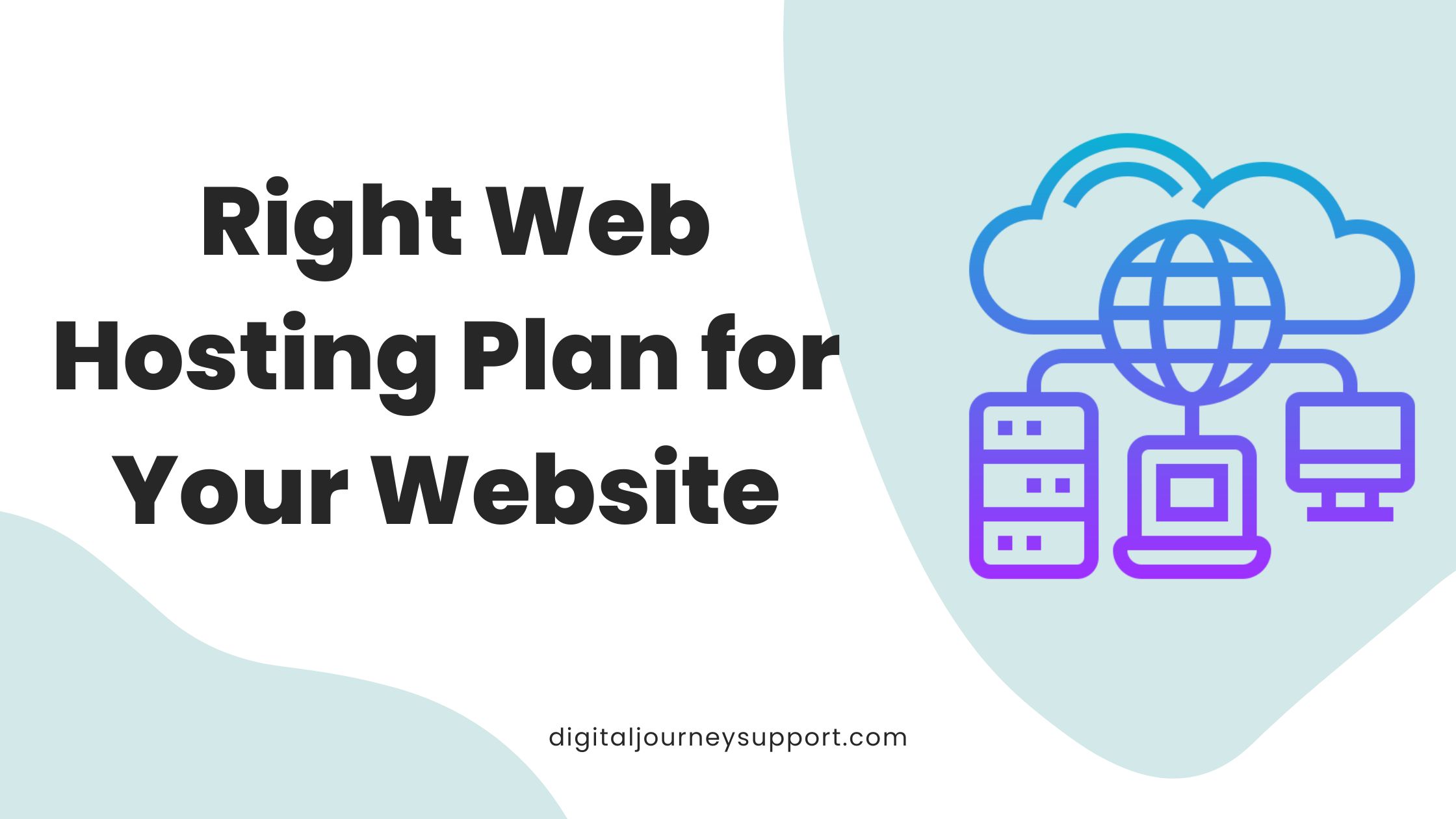When it comes to building a website, one of the most important decisions you’ll make is choosing a web hosting plan. Your web host is essentially the foundation of your website, providing the necessary resources and support to keep your site up and running. With so many options available, it can be overwhelming to know which plan is the best fit for your needs. In this blog post, we’ll take a look at some of the key factors to consider when choosing a web host, and provide examples to help you make the best decision for your website.
Understanding Your Website’s Needs
The first step in choosing a web host is to understand the specific needs of your website. Are you building a small, personal blog or a large e-commerce site? Will you need to host multiple domains or just one? Will you be using specific software or tools that require specific server configurations? Answering these questions will help you determine the type of web hosting plan that is best for your website.
For example, if you’re building a small personal blog, a shared hosting plan may be the perfect fit. Shared hosting plans are typically the most affordable option and offer all the resources you’ll need to get your blog up and running. On the other hand, if you’re building a large e-commerce site, you’ll likely need a VPS or dedicated hosting plan to accommodate the increased traffic and resource demands of your site.
Web Hosting Types
There are several different types of web hosting available, each with its own set of features and benefits. Some of the most common types include shared hosting, VPS hosting, and dedicated hosting.
- Shared hosting: Shared hosting plans are the most affordable option and are great for small personal blogs or small business websites. With shared hosting, your website shares server resources with other websites on the same server. This means that your website’s performance may be affected by the performance of other websites on the same server.
- VPS hosting: VPS hosting, or Virtual Private Server hosting, is a step up from shared hosting. With VPS hosting, your website is allocated a specific amount of server resources, giving you more control over your website’s performance. This is a great option for small to medium-sized businesses or blogs that receive a moderate amount of traffic.
- Dedicated hosting: Dedicated hosting is the most expensive option, but it also offers the most resources and control. With dedicated hosting, you have a dedicated server solely for your website, giving you complete control over the server’s resources and performance. This is the best option for large businesses or websites that receive a high amount of traffic.
Also read this article: A Beginner’s Guide to Web Hosting
Which hosting plan is best for beginners?
For beginners, a shared hosting plan is typically the best option. Shared hosting plans are the most affordable and offer all the resources you’ll need to get your website up and running. They are designed for small personal blogs or small business websites, and typically offer features such as a control panel for managing your account, email hosting, and automatic backups.
Shared hosting plans are a great starting point for beginners because they are easy to set up and manage, and the cost is low. The provider takes care of the maintenance and technical aspects of running the server, such as software updates, security patches, and backups. This allows beginners to focus on building their website and creating content without having to worry about technical details.
Additionally, many shared hosting providers also offer website builders, which are user-friendly tools that make it easy for beginners to create and customize their websites without needing any coding knowledge.
Some popular shared hosting providers for beginners include Bluehost, HostGator, and SiteGround. These providers offer a range of shared hosting plans at different price points, making it easy for beginners to find a plan that fits their budget and needs.
What makes a good web hosting service?
A good web hosting service should offer a combination of the following features:
- Reliability: A good web hosting service should have a high uptime guarantee, meaning that your website should be accessible to visitors most of the time.
- Speed: A good web hosting service should have fast loading times for your website, as this can greatly affect user experience and search engine rankings.
- Security: A good web hosting service should offer robust security features, such as regular backups, firewalls, and SSL certificates, to protect your website from hacking attempts and other cyber threats.
- Support: A good web hosting service should offer comprehensive customer support, including 24/7 availability, multiple channels of communication, and knowledgeable staff who can assist with any issues or questions you may have.
- Scalability: A good web hosting service should offer scalable options, meaning that you can easily increase or decrease the resources your website uses as needed. This ensures that your website can grow with your business.
- Pricing: A good web hosting service should offer a range of pricing options to suit different budgets and website needs. They also should have a clear and transparent pricing policy.
- Additional features: Some web hosting providers may offer additional features such as website builders, email hosting, or domain registration. These can be useful for those who are just starting and want to set up their website quickly and easily.
It is also important to consider the reputation of the web hosting provider, reading reviews and testimonials from other customers can give you an idea of the level of service and support you can expect.
Suggested Post:The Ultimate Guide to On-Page SEO
Examples of Web Hosting Providers
There are many web hosting providers available, each with its own set of features and pricing plans. Here are a few examples of popular web hosting providers that offer a range of options to meet the needs of different types of websites:
- Bluehost: Bluehost is a great option for those just getting started with their website. They offer a range of affordable shared hosting plans, as well as VPS and dedicated hosting options.
- Hostinger: Hostinger is a web hosting provider that offers a range of shared hosting plans at very affordable prices. They offer a user-friendly control panel, a wide variety of tools and features, and 24/7 customer support. Hostinger also has a good uptime and load time, which ensures that your website is always available and fast to load.
- GoDaddy: GoDaddy is a well-known web hosting provider that offers a range of shared hosting plans, along with domain registration and other website-related services. They also offer a user-friendly control panel, automatic backups, and 24/7 customer support. GoDaddy also has a good uptime and load time, which ensures that your website is always available and fast to load. They also have a website builder for beginners to create their website easily.
In conclusion,
choosing the right web hosting plan for your website is an important decision that can greatly impact the performance and success of your site. When deciding on a web hosting plan, it’s important to consider the specific needs of your website, such as the amount of traffic you expect, the type of content you’ll be publishing, and any specific software or tools you’ll be using.
Shared hosting plans are typically the best option for beginners, as they are affordable, easy to set up and manage, and offer all the resources you’ll need to get your website up and running. Popular shared hosting providers for beginners include Bluehost, HostGator, SiteGround, Hostinger, and GoDaddy. Each of these providers offers a range of shared hosting plans at different price points, making it easy for beginners to find a plan that fits their budget and needs.
It is also important to consider the uptime, load time, security, support, scalability and additional features when choosing a web hosting provider. Remember to read reviews and testimonials from other customers to get an idea of the level of service and support you can expect.
In the end, the right web hosting plan for your website will depend on your specific needs and budget, but by considering the factors discussed in this blog post, you can be sure to make an informed decision that will set your website up for success.





[…] Also Read This: Choosing the Right Web Hosting Plan for Your Website […]